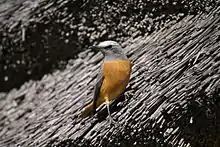Rock thrush
The rock thrushes, Monticola, are a genus of chats, medium-sized mostly insectivorous or omnivorous songbirds. All are Old World birds, and most are associated with mountainous regions.
| Rock thrushes | |
|---|---|
 | |
| Male short-toed rock thrush (Monticola brevipes) | |
| Scientific classification | |
| Kingdom: | Animalia |
| Phylum: | Chordata |
| Class: | Aves |
| Order: | Passeriformes |
| Family: | Muscicapidae |
| Genus: | Monticola F. Boie, 1822 |
| Type species | |
| Turdus saxatilis Linnaeus, 1766 | |
| Species | |
|
13, see text | |
| Synonyms | |
| |
Taxonomy
The genus was erected by the German naturalist Friedrich Boie in 1822.[1][2] Monticola is the Latin word for mountain-dweller or mountaineer.[3] The genus was formerly included in the thrush family Turdidae.[4] Molecular phylogenetic studies published in 2004 and 2010 showed that the species are more closely related to members of the Old World flycatcher family Muscicapidae.[5][6]
The genus contains the following species:[7]
- White-winged cliff chat, Monticola semirufus (formerly in Thamnolaea)[8]
- Cape rock thrush, Monticola rupestris
- Sentinel rock thrush, Monticola explorator
- Short-toed rock thrush, Monticola brevipes
- Miombo rock thrush, Monticola angolensis
- Common rock thrush, Monticola saxatilis
- Little rock thrush, Monticola rufocinereus
- Blue rock thrush, Monticola solitarius
- Chestnut-bellied rock thrush, Monticola rufiventris
- Blue-capped rock thrush, Monticola cinclorhyncha
- White-throated rock thrush, Monticola gularis
- Littoral rock thrush, Monticola imerinus
- Forest rock thrush, Monticola sharpei
- Benson's rock thrush, Monticola sharpei bensoni
- Amber Mountain rock thrush Monticola sharpei erythronotus
Fossil record
Monticola pongraczi (Pliocene of Beremend, Hungary) [9]
References
- Mayr, Ernst; Paynter, Raymond A. Jr. (1964). Check-list of Birds of the World. Volume 10. Cambridge, Massachusetts: Museum of Comparative Zoology. p. 135.
- Boie, F. (1822). "Ueber Classification, insonderheit der europäischen Vogel". Isis von Oken (in German). 10–11. Col. 552.
- Jobling, James A. (2010). The Helm Dictionary of Scientific Bird Names. London: Christopher Helm. p. 260. ISBN 978-1-4081-2501-4.
- Dickinson, E.C., ed. (2003). The Howard and Moore Complete Checklist of the Birds of the World (3rd ed.). London: Christopher Helm. ISBN 978-0-7136-6536-9.
- Voelker, G.; Spellman, G.M. (2004). "Nuclear and mitochondrial DNA evidence of polyphyly in the avian superfamily Muscicapoidea". Molecular Phylogenetics and Evolution. 30: 386–394. doi:10.1016/S1055-7903(03)00191-X.
- Sangster, G.; Alström, P.; Forsmark, E.; Olsson, U. (2010). "Multi-locus phylogenetic analysis of Old World chats and flycatchers reveals extensive paraphyly at family, subfamily and genus level (Aves: Muscicapidae)". Molecular Phylogenetics and Evolution. 57 (1): 380–392. doi:10.1016/j.ympev.2010.07.008. PMID 20656044.
- Gill, Frank; Donsker, David (eds.). "Chats, Old World flycatchers". World Bird List Version 6.2. International Ornithologists' Union. Retrieved 20 May 2016.
- Zuccon, D.; Ericson, Per G.P. (2010). "The Monticola rock-thrushes: phylogeny and biogeography revisited". Molecular Phylogenetics and Evolution. 55: 901–910. doi:10.1016/j.ympev.2010.01.009. PMID 20079862.
- Kessler, E. 2013. Neogene songbirds (Aves, Passeriformes) from Hungary. – Hantkeniana, Budapest, 2013, 8: 37-149.
Further reading
- Outlaw, R.K.; Voelker, G.; Outlaw, D.C. (2007). "Molecular systematics and historical biogeography of the Rock-thrushes (Muscicapidae: Monticola)". The Auk. 124 (2): 561–577. doi:10.1642/0004-8038(2007)124[561:MSAHBO]2.0.CO;2.

External links
| Wikimedia Commons has media related to Monticola. |
- Rock thrush videos on the Internet Bird Collection
This article is issued from Wikipedia. The text is licensed under Creative Commons - Attribution - Sharealike. Additional terms may apply for the media files.